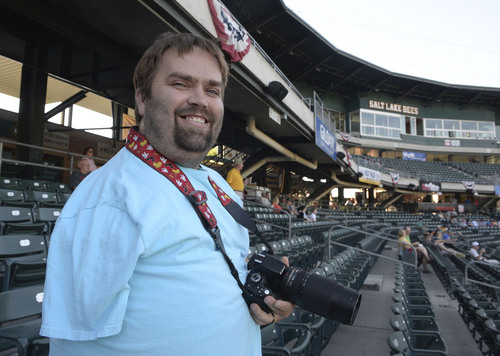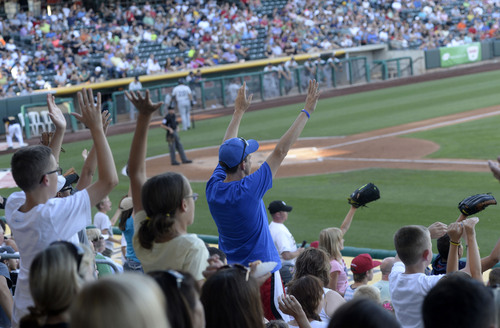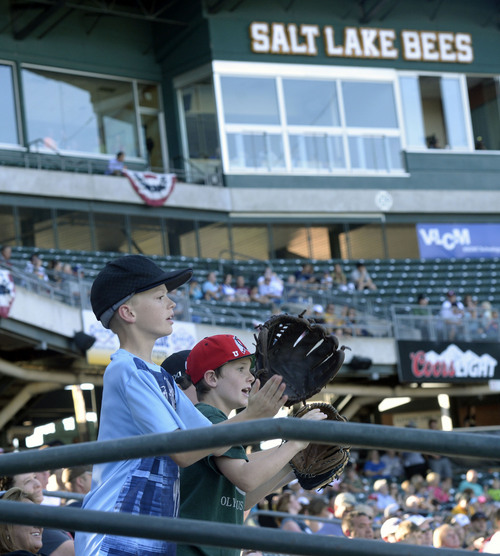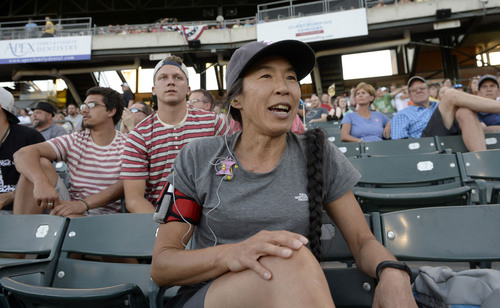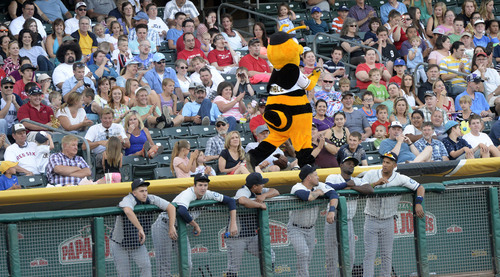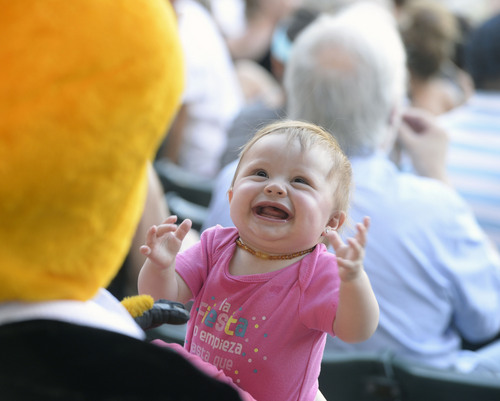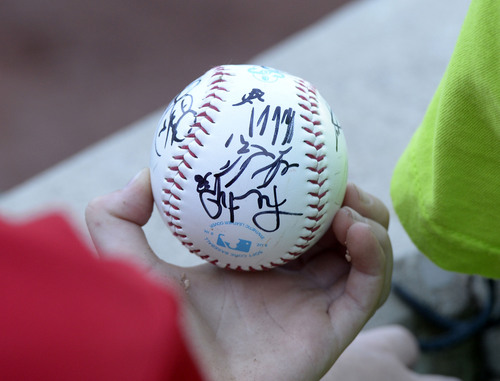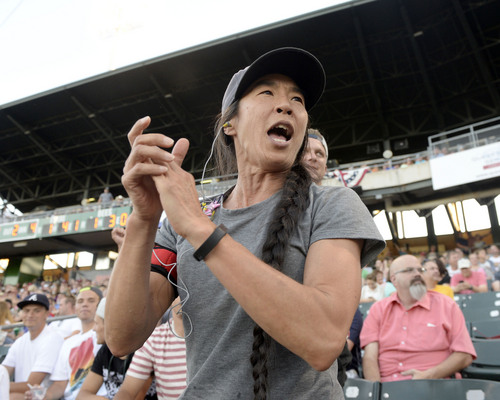This is an archived article that was published on sltrib.com in 2014, and information in the article may be outdated. It is provided only for personal research purposes and may not be reprinted.
Marc Amicone, the long-time vice president and general manager of the Salt Lake Bees, knows his audience.
He understands the majority of fans who flock to Smith's Ballpark every summer probably don't understand the infield-fly rule.
A walk? A walk-off?
What's the difference?
"In minor league baseball," Amicone says, "they are the biggest chunk of your ticket-holders. The biggest group we have is the casual fan — the one who comes out to a couple of games a year."
There are exceptions, however.
The Bees sell about 1,400 season tickets, according to Amicone. Within that core is a sub-culture of rabid fans who love baseball, closely follow the players, savor the victories and are a little disappointed on the drive home after defeats.
These die-hards attend every night — rain or shine, freezing cold or searing heat — despite every weather-related curveball Mother Nature throws at them.
"The hard-core fan is very important to us," Amicone said. "They give you that consistency. You know they are going to be there [despite] the weather or if the team is struggling. They're a solid group you know is coming to watch a baseball game. … You have to have them in this business."
Anita Tsuchiya is a former competitive athlete and sports administrator who has been a season ticket-holder since 1998.
After moving from Seattle to Salt Lake a year earlier, she found herself looking for something to do in her spare time, since she no longer lived close to family members or friends.
"I started coming to these games," she said, "and it was like, 'Wow.' ... Some people like night clubs. I like baseball."
Tsuchiya, a personal trainer, sits just beyond the Bees' dugout. She is two rows up the from the field. From her vantage point, she's in excellent position to study the game, which is what fascinates her about it.
"You can look at baseball two ways — one as entertainment and one as an athletic event," she explained. "For me, it's more about the athletes — developing athletes. And that's what the minor league baseball is all about. ... I like look at how athletes try to figure things out. How they work the count. How they adjust to a curve ball. The strategy [managers] use. Things like that."
Robert Church and his wife, Brittany, are proud members of the I-Don't-Miss-a-Game Club that is so important to the success of the Bees. They sit in the same place — Section 9, Row 19, Seats 1 and 2 — every night Amicone opens the gates.
"Baseball is the purest sport around," Church said. "It doesn't end in a tie. There is no time limit on it. It's sport made right."
A banker, Church and his wife live in Kearns. They spend $1,000 a year on their seats, located above the Bees' dugout along the right field line. Parking costs another $400.
"This is what we do for our Christmas," Church said. "Our season tickets, we wouldn't trade them for the world."
Not even in April, when it's 30 degrees.
"We just pack two or three bags of cold-weather gear," Church said. "We like it when the weather gets warmer, obviously, but the fans who are here in April and September are the dedicated ones."
Last season before a game on a particularly cold night, the Bees' Scott Cousins approached Church and his wife as they stood along the wall near the dugout seeking autographs.
"Scotty's got his sleeves on [and] his gloves on," Church said. "He's freezing. When he was done stretching and stuff, he came over and said, 'You guys are either the most dedicated fans we have or you're insane. We haven't quite decided yet.'"
Church fell in love with baseball as a young fan of the Salt Lake Trappers, a rookie league team that played at old Derks Field between 1985 and 1992. In 1987, the team set a professional baseball record by winning 29 straight games, creating a national media frenzy.
"I got started with the Trappers," Church laughed, "because my dad raised us right. … I grew up on Pioneer League ball."
In 1994, however, Triple-A baseball returned to Salt Lake for the first time in a decade when Joe Buzas bought the Portland Beavers and — with the promise of a new stadium — moved them to Utah.
In its first season back in the Pacific Coast League, Salt Lake drew 713,224 fans, setting a record.
Still, Church wasn't convinced.
His love of the Trappers, who moved to Ogden, prevented him from embracing Triple-A baseball.
"I was burned as hell when Buzas bought the territory," he said.
Church was only a casual fan of the Bees until 2008, when circumstances returned him to the ballpark.
"I had a buddy of mine who was trying to help me get out back into circulation after a messy divorce," he said.
The Bees helped rekindle the passion, too. They won 21 of their first 22 games, which is the best start to a season in minor league history.
"They kind of got me hooked — again," Church said.
During the season, a 21-year-old pitcher named Nick Adenhart often took time from his pregame ritual to stop and visit with Church and his wife.
Adenhart finished the season with a 9-13 record. He started 2009 with the parent Los Angeles Angels. In his first start that season, he pitched six scoreless innings in a game against Oakland.
Church watched on television.
"I was in the process of moving," he said. "It was the last night my TV was connected at my old place. I remember seeing him freeze [Jason] Giambi with a vicious curveball. The look on Giambi's face was classic. Utter shock. I guess he didn't expect such a young kid to throw a curveball like that."
Two hours after the game, Adenhart was a passenger in a car that was broadsided by a drunk driver. He died. So did two others. The driver was found guilty on three counts of second-degree murder. His sentence: 51 years-to-life in prison.
"We talk to these guys and get to know them outside the bounds of the ballpark," said Church, who is a regular at Bees' charity events. "We get to know them and, at this level, they really care about their fans. There's no other sport where that happens, I don't think." PCL attendance
Pacific Coast League attendance, through Monday night:
Team Games Total Average
Round Rock Express 43 352,040 8,187
Sacramento River Cats 47 380,272 8,091
Albuquerque Isotopes 44 349,699 7,948
El Paso Chihuahuas 43 329,894 7,672
Fresno Grizzlies 42 278,002 6,619
Oklahoma City RedHawks 44 275,734 6,267
Iowa Cubs 47 290,129 6,173
Memphis Redbirds 44 264,187 6,004
Salt Lake Bees 43 256,171 5,957
Omaha Storm Chasers 42 214,505 5,107
New Orleans Zephyrs 43 217,211 5,051
Reno Aces 48 238,921 4,978
Colorado Springs Sky Sox 46 222,630 4,840
Las Vegas 51s 48 227,764 4,745
Nashville Sounds 46 200,327 4,355
Tacoma Rainiers 41 162,749 3,969


